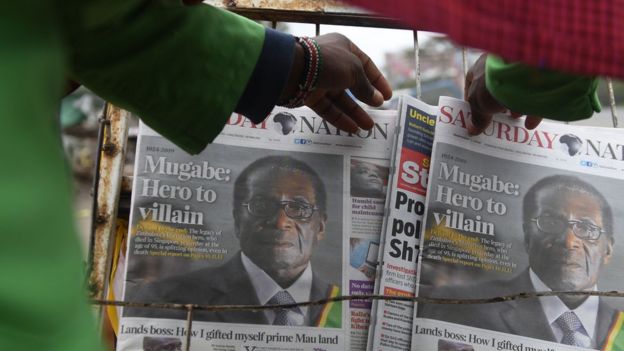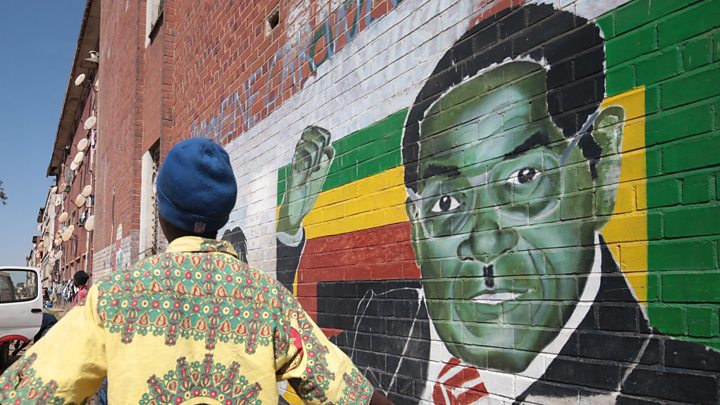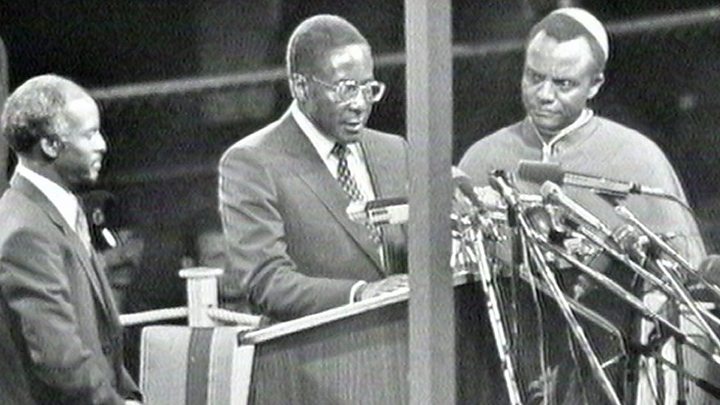
There is a deep fascination with him in the UK. Despite the drama of Brexit, his death was top news across the papers and TV channels. I was taken aback when I saw his image on a massive news screen at King’s Cross station in London announcing his death. Once feted by the Queen, now almost universally reviled, what is it about the dramatic tragedy in the narrative of a transition from ‘hero’ to ‘villain’ that so captivates people, but also blinds us to the complexities of history?
This complexity, and the importance of a deeper history, comes across in some of the better reflections on his death. There is much that’s already been written, but there are a few articles that have stood out for me. The piece ‘Mugabe: a man of more than one story’, for example, highlights the multiple threads of a complex narrative, as does Alex Magaisa’s BSR piece, which urges us not to forget the victims of Mugabe’s regime. Perhaps surprisingly, but like many Zimbabweans of his age, Tendai Biti, once tortured by the regime, says ‘I don’t feel bitterness. I feel indebtedness’. The missed opportunities of the liberation are reflected on in many pieces, including by Fadzayi Mahere, who argues that he ‘killed the freedoms he had worked so hard for’. Roger Southall, meanwhile, reflects on his legacy alongside other liberation party leaders in the region, pointing out that he is ‘as divisive in death as he was in life’. A typically quirky take comes from Percy Zvomuya focusing on deeper family backgrounds and historical contingencies in the piece, Robert Mugabe: the leader who shouldn’t have been. And my favourite of all is the 2017 article by Everjoice Win, widely recirculated in the past days, which captured the moment around the ‘coup’, but seems even more apposite today, and reflects the feelings of many.
Why has Mugabe’s passing attracted so much attention, particularly internationally? Some while ago, Miles Tendi, a Zimbabwean scholar and professor at Oxford University, pointed to the roots of the media fascination with Mugabe in the UK:
“Mugabe is the British media’s bogeyman for everything that is wrong with Africa and one can never escape the naked reality that the fallout from ZANU-PF’s violent eviction of white farmers in Zimbabwe from 2000 onwards, many of whom were British descendants, continues to attract a disproportionate amount of international focus compared to other more severe crises…”
In a similar vein, back in 2008, the renowned Ugandan scholar, Mahmood Mamdani pointed out in his controversial essay for the London Review of Books:
“It is hard to think of a figure more reviled in the West than Robert Mugabe. Liberal and conservative commentators alike portray him as a brutal dictator…. There is no denying Mugabe’s authoritarianism, or his willingness to tolerate and even encourage the violent behaviour of his supporters…. [but this] gives us little sense of how Mugabe has managed to survive. For he has ruled not only by coercion but by consent, and his land reform measures, however harsh, have won him considerable popularity, not just in Zimbabwe but throughout southern Africa. In any case, the preoccupation with his character does little to illuminate the socio-historical issues involved”.
Mugabe’s death reminded me of the screening of Simon Bright’s film, Robert Mugabe… What Happened? at Sussex some years ago. An earlier blog observed that it is a powerful documentary, using fascinating archival footage, together with interviews with key figures in the opposition movement in Zimbabwe. It tells a sympathetic, historically-informed, but still highly critical, story about the man. With Mugabe gone, it is well worth watching again.
It is considerably more nuanced than much of the mainstream commentary that has emerged following his death. This typically follows the hero-to-villain storyline, often attached to the positive then evil influence of his two wives, Sally and Grace. Land reform in 2000 is often marked as the turning point, with the story of land reform being given the usual, misinformed gloss of disaster, turning Zimbabwe from ‘breadbasket to basket case’, the result of party cronies being given the land, and poorly qualified poor farmers making matters worse. I have largely ceased to engage with these narratives, coming from many who really should know much better by now, and I am not going to rehearse the argument again that these views are grossly misinformed here. There are now 360 blogs on Zimbabweland, and many more research articles besides, which together give a more nuanced story.
Too often in mainstream accounts, the role of the British in the Mugabe story is glossed over. Yet the British government’s complicity – for example in the silence about the massacres by the Fifth Brigade in Matabeleland in the 1980s – was significant. The failure of the British to push a more complete settlement at Lancaster House in 1979, and of course the diplomatic gaffe of the infamous ‘Clare Short letter’ in 1997, are all part of the picture. The resentments and hostility rose to a head in the late 1990s, as Mugabe and Blair locked horns. And, while commentaries are critical of white Rhodesia and Ian Smith’s UDI rule, they often do not explore the failure of a more complete reconciliation and integration of whites in the new Zimbabwe following Independence.
At our film screening panel discussion back in 2012, this was an issue tackled by Denis Norman, who served in Mugabe’s cabinet after Independence, and came from being the head of the white Commercial Farmers’ Union. He conceded that more could have been done back then, especially on land reform. There was an unwritten political contract between white farmers and the new state that whites could farm and make money, but not be involved in opposition politics, and land reform, despite the liberation war rhetoric, was parked. This fell apart with the launch of the MDC, and the support of white farmers of an opposition movement. The failure of the donor-brokered land conference in 1998 was a key moment, as no side was willing to compromise. The land invasions that followed were then perhaps inevitable.
As a number of the more sophisticated commentaries highlight, countering the hero-to-villain narrative means emphasising the continuities in the way politics have been played out in Zimbabwe since Independence, with Mugabe at the centre. A lack of tolerance of alternative views, violence and oppression have all been a consistent pattern, and stretch into the the pre-Independence period and the nationalist struggle (and indeed in particular the ‘struggles within the struggle’). A transition from militarised, violent liberation war struggle to peaceful, democratic governance did not happen.
It is not a question of seeing a golden age of the 1980s to contrast with the period since 2000. While there have been important changes, there are also repeated patterns. This is why the much-hailed 2017 ‘coup’ was doomed to failure, and perhaps no surprise that the Mnangagwa regime has seen much continuity, notably in violent repression of opposition forces. This is of course why a democratic transition, with a strong constitutional base, remains so critical; to shed once and for all this violent history.
In assessing Mugabe’s complex legacy, the positive legacies of massively improved education and health services for all in the 1980s and land redistribution to smallholders, especially post-2000, have to balanced against the persistent use of violence, gross economic mismanagement and the failure to develop a democratic state. As opposition politician, Tendai Biti, noted on his death, Mugabe was a ‘coalition of controversies’.
This post was written by Ian Scoones and first appeared on Zimbabweland
Photo credit: President of Zimbabwe Addresses UN General Assembly, 25 Sep 2009. UN Photo/Marco Castro. www.unmultimedia.org/photo/ via flickr)
Post published in: Featured








 Kerriann Stout is a millennial law school professor and founder of
Kerriann Stout is a millennial law school professor and founder of 
 Tom Kulik is an Intellectual Property & Information Technology Partner at the Dallas-based law firm of
Tom Kulik is an Intellectual Property & Information Technology Partner at the Dallas-based law firm of 



